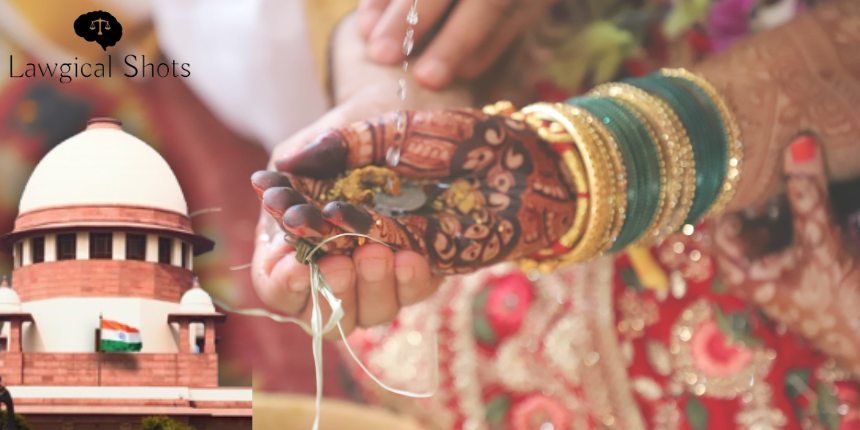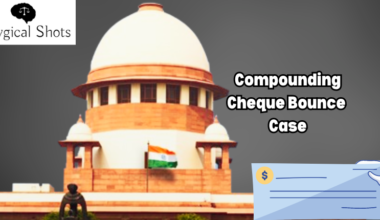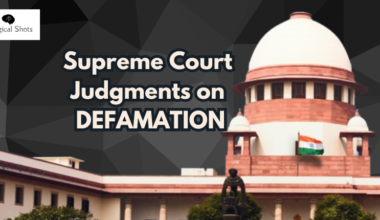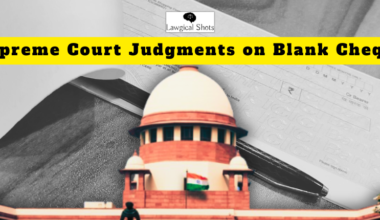Is a Hindu marriage invalid without ceremonies? Then does that mean that compliance with the Court marriage age is a myth if adult Hindus wish to get married through legal process? Is registration of marriage the same concept under the Hindu Marriage Act, 1955 and Special Marriage Act 1954? All these queries were recently answered by the Supreme Court. The Division Bench of Justice BV Nagarathna and Justice Augustine George Masih were dealing with Civil Transfer Petition No. 2043 of 2023 in Dolly Rani v. Manish Kumar Chanchal. This is a legal story which is crucial for laymen, before landing upon the findings of the Courts.
Background
The parties were trained commercial pilots, engaged to be married on March 3, 2021. They claimed of ‘solemnizing’ their marriage on July 7, 2021. The couple obtained a marriage certificate from Vadik Jankalyan Samiti, based on which, the Marriage Certificate was issued by the Registrar under Uttar Pradesh Marriage Registration Rules, 2017. Their families fixed October 25, 2022 as the date for performing the couple’s marriage ceremony as per Hindu rites and customs.
Meanwhile, the two lived separately and differences ignited between them. The wife claimed dowry demand from the husband’s family. The wife filed an FIR alleging harassment, cruelty and dowry demands against the husband and his family, among other offences. Almost 4 months later, the husband filed a petition for divorce under Section 13(1)(ia) of HMA at a Family Court in Bihar.
The instant petition was filed under Section 25 of the Civil Procedure Code, 1908 by the wife. She primarily sought transfer of divorce petition filed by the husband from a Family Court of Bihar to that of Jharkhand where she was residing at her maternal home. However, during pendency of the transfer petition, the husband-wife jointly approached the Apex Court with an application under Article 142 of the Constitution of India. They sought declaration of marriage to be invalid in the eyes of law, and a decree of declaration of the marriage certificate so issued to be null and void in the absence of a valid Hindu Marriage. They also sought quashing the FIR filed by the wife against the husband and his parents.
Court’s Analysis on Ceremonies and Registration of Hindu Marriage
Law for Hindu Marriage Ceremonies
The Bench perused Section 7 of HMA pointing towards the ceremonies of a hindu marriage. With reference to the word ‘solemnised’, the Apex Court explained that it “means to perform the marriage with ceremonies in proper form.” It added that unless the marriage was performed through required ceremonies and due form, it could not be ‘solemnised’. The Court further upheld the requirements of rites and ceremonies including ‘saptapadi’. It means that the husband and wife jointly take 7 steps before the holy fire, and the marriage becomes complete with the 7th step.
Can a Hindu marriage be solemnised without ceremonies?
The Court remarked that “Where a Hindu marriage is not performed in accordance with the applicable rites or ceremonies such as saptapadi when included, the marriage will not be construed as a Hindu marriage. In other words, for a valid marriage under the Act, the requisite ceremonies have to be performed and there must be proof of performance of the said ceremony when an issue/controversy arise.”
Hindu Wedding Ceremonies v. Marriage Registration
The Bench further clarified that in the absence of requisite ceremonies under Section 7 of HMA, mere issuance of marriage certificate neither confirms any marital status, nor establishes a marriage under Hindu Law. Commenting upon the value of the certificate issued first, the Court said that “The certificate issued by Vadik Jankalyan Samiti (Regd.) in the absence of any indication as to the rites and customs that were performed and as to whether the requirements under Section 7 of the Act was complied with would not be a certificate evidencing a Hindu marriage in accordance with Section 7 of the Act. In the absence of any ceremony being performed such a certificate could not have been issued.”
Since the Marriage Registration Officer issued a marriage certificate based on the Vadic marriage certificate, the Bench perused Section 8 of HMA. It further clarified that Section 8 of HMA also requires a marriage to be performed in accordance with Section 7 for issuance of certificate under Section 8.
Hindu Marriage Registration – A must?
While speaking of the requirement of registration of a Hindu Marriage, the Court expressed that “The advantage of registration is that it facilitates proof of factum of marriage in a disputed case. But if there has been no marriage in accordance with Section 7, the registration would not confer legitimacy to the marriage.” The Court reiterated that registration of Hindu Marriage only facilitated a proof, for which, a Hindu marriage ceremony has to be performed in accordance with Section 7 of HMA. The Bench further observed that although the parties may have complied with conditions of marriage under Section 5 of HMA, there would be no valid marriage in the eyes of law, if marriage is not solemnised in accordance with Section 7 of HMA. In such circumstances, the Marriage Registration Officer cannot register such a marriage. Thus, a certificate so issued would not confer any legitimacy to such marriage.
Hindu Marriage is a Sacrament
The Apex further discussed the sacred character of a Hindu Marriage, being a ‘sacrament or a samskara’, the foundation for a new family. The Bench observed that “In effect a union of two persons under the provisions of the Act, by way of a Hindu marriage gives them the status and character of being a husband and wife in society. The said status is of significance inasmuch as a man and a woman cannot be treated as a husband and a wife unless a marriage is performed or celebrated with proper and due ceremonies and in the prescribed form. In the absence of any solemnisation of a marriage as per the provisions of the Act, a man and a woman cannot acquire the status of being a husband and a wife to each other.”
With the above observation, the Court deprecated the practice among youngsters seeking to acquire the status of husband and wife in the absence of a valid marriage ceremony. The Court further acknowledged the applicability of the Special Marriage Act upon Hindus. With respect to HMA, the Court clarified that there has to be compliance with the provisions prescribed regarding solemnisation of a marriage. The Supreme Court further remarked that “any registration of a marriage which has not at all taken place under Section 8 of the Act and as per the rules made by the State Government would not be evidence of a Hindu marriage and also does not confer the status of a husband and a wife to a couple.”
Comments on Quick Marriages
Speaking of the recent trend of couples intending to solemnise marriage on a future date seeking registration of marriage under Section 8 of HMA based on a document purportedly issued as a proof of ‘solemnisation of marriage’, the Bench made it clear that “any such registration of a marriage before the Registrar of Marriages and a certificate being issued thereafter would not confirm that the parties have ‘solemnised’ a Hindu marriage.” For registration of marriage to apply for Visa for emigration to foreign countries, just to save time to await formalising a marriage ceremony, the Court deprecated such practices. The Court further raised concerns that “What would be the consequence, if no such marriage is solemnised at all at a future date? What would be the status of the parties then? Are they husband and wife in law and do they acquire such status in society?”
Reminding Hindu Marriage Sacrament
While only touching upon the legitimacy of children born within and outside the wedlock, the Court urged young women and men to deeply think about the sacred nature of the institution of marriage in Indian society, before entering into one. The Court commented that “A marriage is not an event for ‘song and dance’ and ‘wining and dining’ or an occasion to demand and exchange dowry and gifts by undue pressure leading to possible initiation of criminal proceedings thereafter. A marriage is not a commercial transaction. It is a solemn foundational event celebrated so as to establish a relationship between a man and a woman who acquire the status of a husband and wife for an evolving family in future which is a basic unit of Indian society. A Hindu marriage facilitates procreation, consolidates the unit of family and solidifies the spirit of fraternity within various communities.”
The Bench further remarked that “The Hindu Marriage Act, 1955 solemnly acknowledges both the material and spiritual aspects of this event in the married couple’s lives. Besides providing a mechanism for registration of marriages in order to confer the status of a married couple and acknowledge rights in personam and rights in rem, a special place is given to rites and ceremonies in the Act. It follows that the critical conditions for the solemnising of a Hindu marriage should be assiduously, strictly and religiously followed. This is for the reason that the genesis of a sacred process cannot be a trivial affair. The sincere conduct of and participation in the customary rites and ceremonies under Section 7 of the Hindu Marriage Act, 1955 ought to be ensured by all married couples and priests who preside over the ceremony.”
Decision – Hindu Marriage Invalid Without Registration
Coming back to the instant facts, the Court declared that the same was not a ‘Hindu Marriage’. Therefore, the Court declared the two marriage certificates as null and void. Th Bench further clarified that the parties in the instant were not married and never acquired the status of husband and wife. Therefore the Court quashed the divorce petition, maintenance case and the FIR against the husband and his parents.








